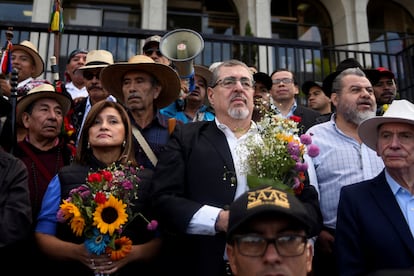The US is restricting visas for nearly 300 Guatemalan lawmakers, others for ‘undermining democracy’
Guatemala faces mounting criticism by world leaders and watchdogs accusing it of attempts to block progressive president-elect Bernardo Arévalo from taking office in January

The Biden administration announced on Monday that it would impose visa restrictions on nearly 300 Guatemalan lawmakers, private sector leaders and their families it accuses of “undermining democracy and the rule of law.”
Guatemala faces mounting criticism by world leaders and watchdogs accusing it of attempts to block progressive president-elect Bernardo Arévalo from taking office in January.
The victory of Arévalo and his Seed Movement party is seen as a threat to those who have long wielded power in Guatemala. The anti-corruption crusader has been a target for months, with arrests of party members, raids and repeated requests to lift his immunity so prosecutors can investigate him directly.
The State Department in a statement condemned “ongoing anti-democratic actions” by prosecutors and other actors and noted “intent to delegitimize Guatemala’s free and fair elections and prevent the peaceful transition of power.”
The State Department did not provide The Associated Press with the names of those subject to visa restrictions.
In its statement, it said those individuals were “responsible for, or complicit in” political targeting of opposition, intimidation of peaceful protestors, raids, opening of ballot boxes and lifting of immunity of electoral magistrates who certified the election.
Last week, prosecutors alleged that minutes seized during a raid of electoral offices showed that results from the presidential runoff vote Arévalo won in August had irregularities and were therefore void.
Arévalo accused the prosecution of seeking to undermine his ability to govern, and was quickly backed by a growing number of international entities like Organization of American States and the European Union, which sent observers to monitor the election and confirmed that voting adhered to democratic standards.
EU foreign policy chief Josep Borrell said Friday that the body was also contemplating sanctions on those attempting to reverse the vote.
“These latest actions and statements of the Public Prosecutor’s Office of Guatemala represent an attempt at a coup d’etat, spearheaded by politically motivated prosecutors,” Borrell said in a statement. “They show contempt for the clear will of Guatemala’s citizens.”
Sign up for our weekly newsletter to get more English-language news coverage from EL PAÍS USA Edition
Tu suscripción se está usando en otro dispositivo
¿Quieres añadir otro usuario a tu suscripción?
Si continúas leyendo en este dispositivo, no se podrá leer en el otro.
FlechaTu suscripción se está usando en otro dispositivo y solo puedes acceder a EL PAÍS desde un dispositivo a la vez.
Si quieres compartir tu cuenta, cambia tu suscripción a la modalidad Premium, así podrás añadir otro usuario. Cada uno accederá con su propia cuenta de email, lo que os permitirá personalizar vuestra experiencia en EL PAÍS.
¿Tienes una suscripción de empresa? Accede aquí para contratar más cuentas.
En el caso de no saber quién está usando tu cuenta, te recomendamos cambiar tu contraseña aquí.
Si decides continuar compartiendo tu cuenta, este mensaje se mostrará en tu dispositivo y en el de la otra persona que está usando tu cuenta de forma indefinida, afectando a tu experiencia de lectura. Puedes consultar aquí los términos y condiciones de la suscripción digital.








































